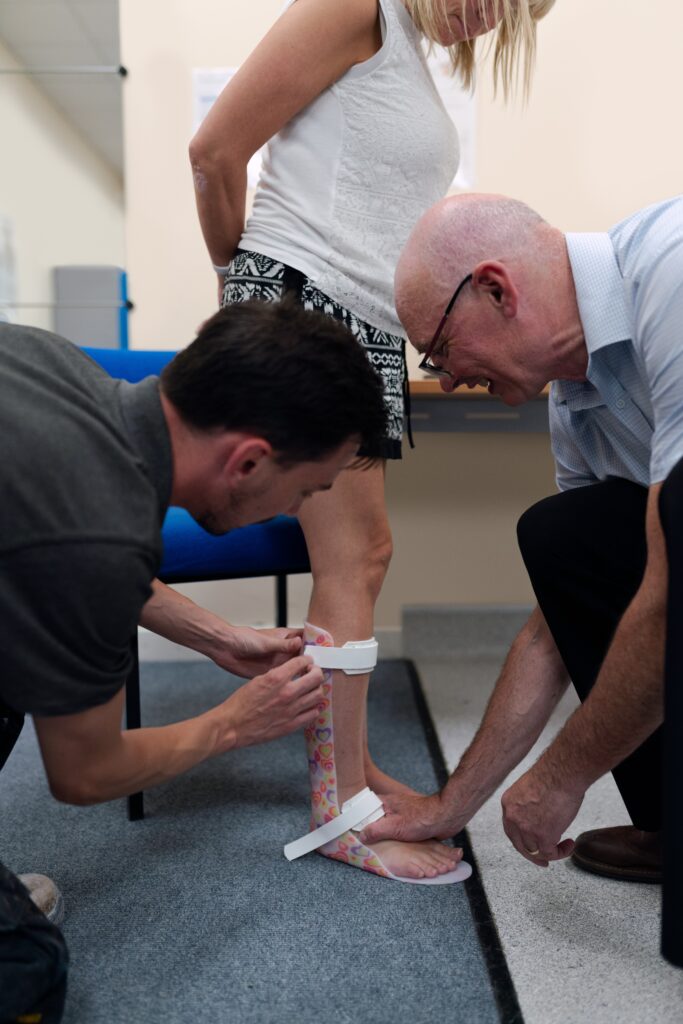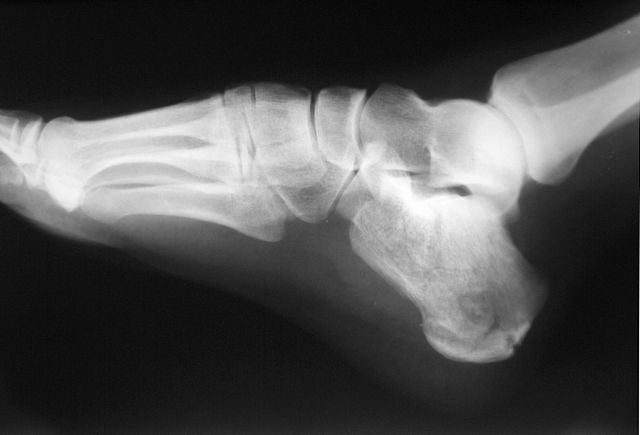above image of Calcaneus Fracture by Jojo shared via CC BY-SA 3.0
A fracture to your heel, or calcaneus bone, can be very painful and disabling. In some instances, mainly before displacement, it can be treated without surgery. However, if the fracture becomes displaced this can lead to the need for surgery. This surgery can include fusion surgery which could limit your mobility with the affected foot. Claims with a missed calcaneus fracture usually involve a situation where a patient could have avoided surgery if their fracture was diagnosed and treated in a timely manner, or the patient could have avoided the need for more significant surgery like fusion surgery.
What Causes A Heel Fracture?
A calcaneus fracture has a number of causes, but it should be suspected in any situation where you have a significant, crushing injury to the bottom of your foot. An example is if you fall from a ladder onto your foot – or have a fall on your foot in general from a height around 6-8 feet. It can also occur from other trauma to the bottom of your foot such as in an auto accident.
Symptoms of a calcaneus (heel) fracture
The following may be symptoms of a heel fracture:
- pain
- swelling
- redness of the foot
- difficulty putting weight on the heel of your foot
- Difficulty walking.
It is usually diagnosed by physical exam and imaging studies like X-Rays or CT scans. If you have a claim for a missed fracture, it could be due to poor treatment by the doctor you initially see in the emergency room of a hospital. An emergency room doctor may not consider that you have a calcaneus fracture despite having symptoms of one, and suffering a trauma to the bottom of your foot that is likely to cause a calcaneus fracture such as a fall from a ladder.

How Medical Negligence Can Cause More Problems
You may have a case if your medical team showed any of the following negligent behaviors in regards to your calcaneus, or hee, fracture:
- Negligence may involve not ordering any imaging studies to rule out a calcaneus fracture.
- Ordering the wrong type of imaging studies – studies that would only give a view of the foot but not the heel.
- The negligence may be against the radiologist if the proper X-Rays were ordered which showed a calcaneus fracture, but the radiologist missed the fracture. (Evidence that the fracture should have been seen can be determined if a later treating doctor, such as an orthopedist, reviews the hospital X-Rays and is able to see a clear calcaneus fracture).
- Negligence could be when a radiologist suspects a fracture based on X-rays taken, recommends further imaging to rule out the fracture, but no follow up imaging is ordered.
How To Have A Successful Missed Calcaneus Fracture Case
What will determine if you have a case is the following: you must be able to prove that your outcome changed due to the delay in diagnosis and treatment of your calcaneus fracture.
Orthopedic experts will need to be consulted to determine if you could have avoided any surgery you now need for the fracture. One way to determine this is if the initial X-Rays where the fracture was missed shows a non-displaced fracture (one where the bones have not shifted) and follow up imaging when the fracture is diagnosed shows a displaced fracture (one where the bones have shifted). Non-displaced calcaneus fractures can be treated through immobilization – casting or bracing your foot to hold the bones in place while they heal. If the fracture is not immobilized and you walk around on the foot it can result in the fracture becoming displaced. Even if your calcaneus fracture was one that needed surgery regardless of when it was diagnosed, you may need a morecomplex and involved surgery you could have avoided if your fracture was diagnosed and treated right away.
Other forms of damages you may have are ongoing complications with your foot you could have avoided if your calcaneus fracture was timely diagnosed and treated, and how those complications affect your enjoyment of your daily life and your work.
You could also have a lost wage claim depending on how the injury affects your work, and outstanding medical bills. The Thistle Law Firm is experienced in handling cases of missed calcaneus fractures. If you believe your calcaneus fracture was missed as a result of medical malpractice or negligence and you suffered harm as a result, the PA medical malpractice attorneys at the Thistle Law Firm is here to take your call at 215-568-6800.

